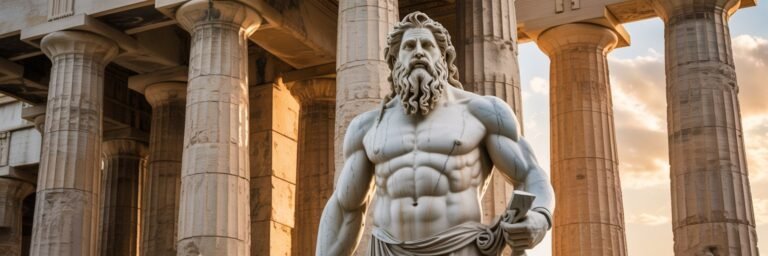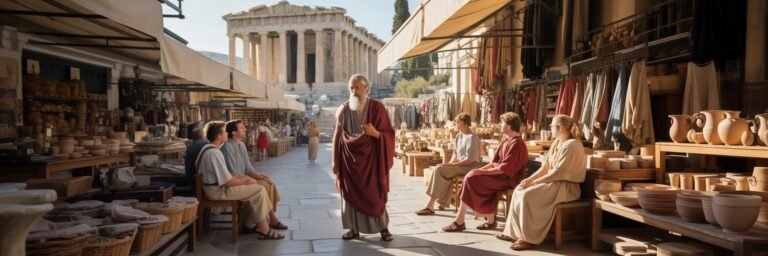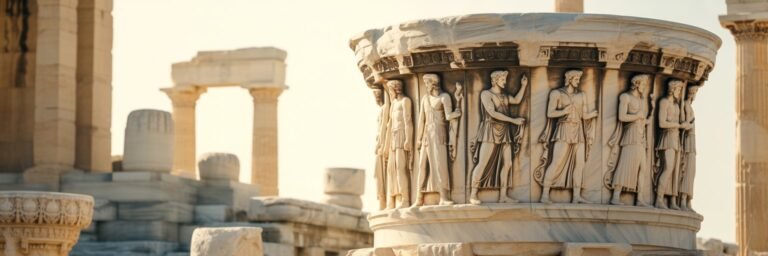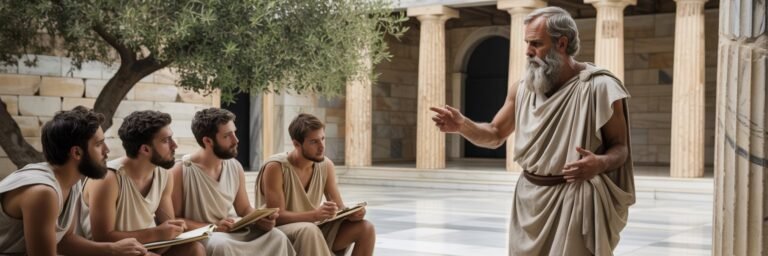INTRODUCTION
Wind back the sands of time, venture into the gloriously complex annals of history, and there you are, standing at the heart of a bustling Ancient Agora, captivated by the magnificence of Classical Greece—a civilization of extraordinary depths. The era, spanning the 5th to 4th century BC, is renowned for shaping Western civilization as we know it today with its significant contributions to art, politics, philosophy, war, and culture. It brought forth legendary figures such as Socrates, Plato, Aristotle, and democracy’s cradle, Athens. So what can we glean from this kaleidoscope of knowledge and culture, and how can we apply these lessons in the contemporary world?
HISTORICAL BACKGROUND
Classical Greece emerged after the tumultuous Dark Ages—burgeoning into a civilization of city-states or Polis such as Athens, Sparta, and Corinth. The 5th century BC, often called the “Golden Age,” saw Athens under Pericles’ leadership, a period characterized by intensive cultural and intellectual activity. Athens’ radical democracy was a revolutionary change from the previously dominant aristocratic rule. Power was in the hands of citizen assemblies, juries, and election officers.
Art and architecture thrived, with iconic structures such as the Parthenon built to honor Athena, the city’s patron deity. In literature, the tragedies of Sophocles and Euripides, and the comedies of Aristophanes enthralled audiences. Philosophy grew with towering figures like Socrates, whose method of inquiry continues to inspire, his student Plato, who founded the academy, and Aristotle, compiling encyclopedia-like tomes on numerous subjects.
THEORIES AND INTERPRETATIONS
Quite opposingly, the helot-populated, militaristic Sparta stands as a polar opposite to Athens’ democracy and intellectual pursuits. Spartan society is often interpreted as a model of social equality and unity through Lycurgus’ Great Rhetra. Some scholars argue that this structure, a justification for oligarchy or rule by a few, was generated to control societal discontent and unequal wealth distribution. Yet, this form of government led to Sparta’s decline as it failed to adapt to changing circumstances—an essential lesson in flexibility and adaptation.
In philosophy, interpretations of Socrates’ daimon, a sort of divine voice that guided him, have varied. While some consider it a manifestation of reasoned introspection, others view it as a spiritual entity or even an early form of intuitive thinking—a compelling reminder of rationality’s limits.
MYSTERIES AND CONTROVERIES
Classical Greece is not without its fair share of controversies. The Antikythera mechanism, a sophisticated device for tracking celestial bodies’ movements discovered in an ancient shipwreck, continues to puzzle historians about Greek technological advancement. Additionally, the mystery of the Oracle of Delphi and her cryptic pronouncements, said to be messages from Apollo, fuels debates about religion’s role and psychology in ancient Greece.
Another infamous debate revolves around the Spartan Krypteia, an institution rumored to involve young Spartans hunting and murdering potential rebellious helots. This brutal rite of passage remains disputed due to conflicting historical reports—an agonizing reminder of societal violence and the importance of balancing power dynamics.
SYMBOLISM AND CULTURAL SIGNIFICANCE
In the realm of symbolism, the owl, associated with Athena, represented wisdom—a constant reminder of Greeks’ keenness for knowledge. The labyrinth and the Minotaur encapsulated the struggle with our inner beasts and the complexity of the psyche. The mythical centaurs represented the dichotomy between civilized and primal instincts, a metaphor for human nature’s dualistic aspect.
Culturally, festivals such as the Panathenaic Games demonstrated the Greeks’ athletic prestige and cultural unity. Their pantheon of gods and goddesses represented various aspects of human experience, underlying the ancient Greeks’ understanding of the world and human nature—a map of the mind, nature, and cosmos imbued with divine significance.
MODERN INVESTIGATIONS
Modern investigations into Greek civilization have unearthed remarkable insights. The discovery of Linear B tablets at Knossos revealed aspects of Mycenaean bureaucracy, offering glimpses into a powerful predecessor to the polis. Investigations into classical ruins, like the Parthenon, provide insights into architectural laws, beauty ideals, and innovative building techniques still relevant today.
Recently, DNA studies point to Africa’s significant influence on Greek genetics, suggesting a more intertwined global history than previously believed—a bold rewriting of racial assumptions in ancient history.
Moreover, explorations of Greek ceramics and sculpture are challenging earlier assumptions about the static nature of Greek art, pointing instead to an environment ripe with innovation and creativity—introducing a nuanced understanding of progress and continuity.
LEGACY AND CONCLUSION
The legacy of Classical Greece is profound. Its politics, philosophy, art, and literature continue to reverberate through centuries. The Athenian democracy is seen as a philosophical precursor to modern democratic ideals, highlighting the importance of citizen engagement and representation.
The concepts birthed by Greek philosophers continue to underpin Western thought and science. Aristotle’s work on logic, physics, biology, metaphysics, and ethics is foundational to numerous disciplines. The tragedies and comedies not only entertain but offer timeless lessons on the human condition, power, and societal norms. They remind us of the compelling power of narrative and of art as critique and reflection.
Greek mythology and its symbolism continue to resonate with us, providing a vehicle for self-reflection and deep-seated archetypal themes. The Olympic Games, a homage to Greek athletic prowess, is a global celebration of sportsmanship, offering a bridge across cultures and nations.
From the cobbled streets of Athens to the towering spires of the Parthenon, the echoes of Classical Greece guide our steps towards understanding the paramount importance of critical thinking, civic virtue, cultural expression, and the ceaseless quest for knowledge. Its lessons serve as a beacon—an enduring reminder of our interconnected histories and shared pursuit of wisdom. Classical Greece, indeed, mirrors our triumphs, struggles, and aspirations, rising from the sands of time as a timeless symbol of human potential.





